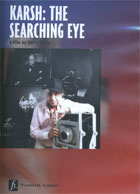
Karsh: The Searching Eye 2009
Distributed by Filmakers Library, 124 East 40th Street, New York, NY 10016; 202-808-4980
Produced by Harry Rasky
Directed by Harry Rasky
DVD, color, 82 min.
Jr. High - Adult
Biography, Art, Photography, Art History, History
Date Entered: 06/17/2009
Reviewed by Louise Greene, Art Library, University of Maryland, College ParkAs befits one who spent his professional life among remarkable people, photographer Yousef Karsh is mannerly and urbane with more than a few stories to tell. But far from star-struck, he speaks instead of the intimate human moments he was privileged to witness in the course of his extraordinary career. Soft-spoken, with strikingly expressive eyes, he seems the very soul of warmth and discretion; at his work, he is decisive, witty, and quietly authoritative. To glimpse the process by which he captured some of the most iconic portraits of the twentieth century is fascinating indeed.
Images of Karsh, himself, include those caught on film by producer/director Harry Rasky, along with older stills and footage documenting his earlier life and work. These unfold against a montage of images, most in black and white, which comprise Karsh’s stunning portfolio. Subjects from Martin Luther King, Jr. to the Marx brothers include artists, actors, writers, scientists, statesmen, athletes, religious leaders – men and women who have shaped our recent history. Newsreel footage and stills, and Karsh’s own reminiscences add important historical context. It is an amazing chronicle of our time.
Produced in 1985, Karsh: The Searching Eye was featured at the time by the Canadian Broadcasting Corporation, but not released until 2009. Because the film is nearly 25 years old, it does not document the later career of the photographer, who died in 2002 at 94. The story of Karsh’s life is as remarkable as that of any of his subjects – the early years in his native war-torn Armenia, his journey as a teenager to Canada where he received a camera from an uncle who was himself a photographer, his studies in Boston and his early career in Ottawa, his rise to international celebrity during World War II with a single unforgettable photograph of Winston Churchill. The film ends with Karsh still in his prime, and one can only imagine that his later life was as rich and fascinating. We are poorer for not finding that story, as well, in this memorable documentary.
Karsh: The Searching Eye is highly recommended for libraries and programs with general collections, and particularly for those with collections in photography, art and history.